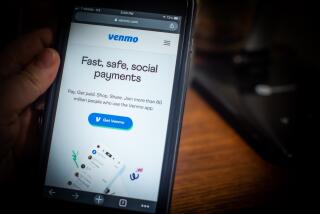Don’t Have a Credit Card? Just Whip Out Your E-Checkbook
- Share via
The Internet shopping revolution leaves out a sizable chunk of potential consumers--the one-third of households without a credit card.
Most Internet retailers still accept only Visa, MasterCard and American Express, but some merchants are experimenting with e-checks, which electronically debit a checking account.
Already used to pay credit card and utility bills online, e-checks are not yet common among Internet merchants. But some retailers--such as Kmart, EBay and even Pillsbury--have added them to their Web sites in an attempt to broaden their customer bases.
Despite their convenience, e-checks have significant downsides for consumers. Unlike credit cards, whose issuers can mediate disputes between merchants and customers, e-checks put the burden squarely on buyers. Plus, many consumers are uncomfortable giving out their checking account numbers.
According to the Federal Reserve, only 67% of households had a credit card in 1998, but 90% have some form of transaction account, such as checking or savings. E-checks may be the only online option for some, but even those with credit can use them to lower their credit card debt.
“This just allows consumers a choice,” said Margaret Weichert, vice president of product development and marketing for Achex, an e-check processor. “It’s not quasi cash, it’s real cash.”
And that spooks some people. With credit cards, users get a few days to a few weeks before they have to actually pay for an online purchase. E-checks, though, deduct the amount from an account much more quickly. And because e-checks give the merchant, rather than the customer, control of the purchase, individuals with alternative means of paying for online purchases may not want to relinquish the consumer rights built into most credit card contracts.
Much like online credit card payments, e-check transactions take place within a secure Internet session. A processor, such as TeleCheck, acts as a middleman, obtaining and delivering the payment from customer to merchant.
After shoppers fill their online shopping carts and are ready to check out, they can opt to use an e-check rather than a credit card. Depending on the processor the online retailer has chosen, the limit on an e-check can be much lower than for credit card transactions.
EBay’s processor, Billpoint, for example, will not accept e-checks for more than $200. Achex, which processes checks for Kmart at https://www.bluelight.com, limits customers to $250 for their first transaction. Afterward, the limit rises to $5,000.
Another processor, Chexpedite, has no limit.
When writing an e-check, users must supply bank name, routing number and account number, as well as their name and address as it appears on the check. Some sites also ask for a driver’s license or Social Security number to verify identity.
“It is at least as secure as a credit card, and maybe even more so,” said Richard Francoeur, president of the Asset Group, which markets Chexpedite.
The online merchant never views this data. It is sent directly to the processor, which then withdraws the appropriate funds. Depending on the processor, it can take two to five business days for the e-check to clear.
If there’s not enough money in an account to cover the e-check, the processor will present it to the bank a second time. The check will either bounce--and the processor will notify the merchant to cancel the order--or clear. Though the processor will then debit the account, it might also charge a collection fee.
Receiving refunds could be tricky for e-check users. With credit card transactions, cardholders can refuse payment. But with e-checks, as with a paper check, the merchant has the money whether or not the customer is satisfied with the purchase.
This is also an issue with unauthorized transactions. Customers have 60 days from the date of an unauthorized transaction to contest it. Rather than petitioning not to pay a charge (as can be done with a credit card company), however, e-check users must petition to have the funds returned because the account already has been debited. And buyers must go without the money until the case settles.
If a bank performs direct deposit transactions without charging extra fees, it should accept electronic check withdrawals as well. Check to make sure.
Although few well-known sites accept e-checks, William Nelson, executive vice president of NACHA, the Electronic Payments Assn., said he believes that the service will catch on.
“If you don’t want to offer it, you may lose a sale,” he said.
*
Times staff writer Christine Frey covers personal technology.
More to Read
Inside the business of entertainment
The Wide Shot brings you news, analysis and insights on everything from streaming wars to production — and what it all means for the future.
You may occasionally receive promotional content from the Los Angeles Times.










